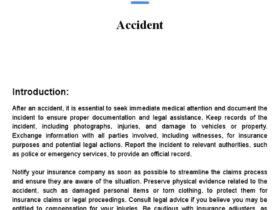Accidents are an unfortunate reality of life, and the financial burden that follows can be significant. Medical bills, lost wages, and other unexpected costs can quickly add up, even with comprehensive health insurance. That’s where accident insurance through your employer can play a vital role in providing a financial safety net. This guide delves into the specifics of accident insurance offered as an employee benefit, helping you understand its coverage, benefits, costs, and whether it’s the right choice for your needs.
What is Accident Insurance Through Your Employer?
Accident insurance, also sometimes called supplemental accident insurance or personal accident insurance, is a type of insurance that provides cash benefits if you experience an accidental injury. This coverage is designed to supplement your existing health insurance, helping to cover out-of-pocket expenses that your primary health plan may not fully cover. Often, accident insurance is offered by employers as part of their employee benefits package.
Unlike workers’ compensation insurance, which specifically covers work-related injuries and illnesses, accident insurance covers accidents that happen both on and off the job. It provides a lump-sum cash payment directly to you, which you can use for any purpose you choose – medical bills, deductibles, living expenses, or even a well-deserved vacation to recover.
What Does Accident Insurance Cover?

The specific coverage offered by accident insurance plans can vary, so it’s crucial to carefully review the details of your employer’s plan. However, most plans typically cover a range of injuries and services resulting from accidents, including:
- Broken Bones: Coverage for fractures, from simple breaks to more complex compound fractures.
- Dislocations: Benefits for dislocated joints, such as shoulders, elbows, or knees.
- Burns: Coverage for burns of varying degrees, often with benefits increasing for more severe burns.
- Dental Injuries: Assistance with the costs of repairing or replacing damaged teeth due to an accident.
- Eye Injuries: Coverage for injuries to the eyes, such as cuts, abrasions, or loss of vision.
- Ambulance Services: Coverage for emergency transportation to a hospital or medical facility.
- Emergency Room Care: Benefits for treatment received in an emergency room following an accident.
- Urgent Care: Coverage for treatment at an urgent care center.
- X-Rays and CAT Scans: Assistance with the costs of diagnostic imaging.
- Hospital Treatment: Coverage for hospital stays, including room and board and other related expenses.
- Surgeries: Benefits for surgical procedures required to treat injuries sustained in an accident.
- Physical Therapy and Rehabilitation: Coverage for physical therapy and rehabilitation services to aid in recovery.
How Does Accident Insurance Work?

Here’s a simplified look at how accident insurance works when offered through an employer:
- Enrollment: You typically enroll in the plan during your employer’s open enrollment period, often in November or December.
- Premiums: You pay a monthly premium for the coverage, which is often deducted directly from your paycheck.
- Accident: If you experience an accident that results in a covered injury, you can file a claim with the insurance company.
- Claim Submission: You’ll need to provide documentation of the accident and your injuries, such as medical bills and records.
- Benefit Payment: Once your claim is approved, the insurance company will pay you a lump-sum cash benefit.
It’s important to note that accident insurance pays benefits regardless of any other health insurance coverage you may have. This means you can receive benefits even if your primary health insurance covers the majority of your medical expenses.
The Cost of Accident Insurance
The cost of accident insurance through your employer can vary depending on several factors, including:
- The level of coverage you choose: Higher coverage levels typically come with higher premiums.
- Your age: Premiums may be slightly higher for older individuals.
- Your employer’s plan design: The specific terms and conditions of your employer’s plan can affect the cost.
Generally, premiums for accident insurance are relatively affordable, often ranging from $5 to $50 per month. However, it’s important to compare the costs and benefits of different plans to determine the best option for your needs.
Is Accident Insurance Worth It for You?
Deciding whether or not to enroll in accident insurance through your employer depends on your individual circumstances and risk tolerance. Here are some factors to consider:
- Your Lifestyle: If you have an active lifestyle or participate in sports or other activities that increase your risk of accidents, accident insurance may be a worthwhile investment.
- Your Health Insurance Plan: If you have a high-deductible health plan, accident insurance can help cover out-of-pocket expenses before your deductible is met.
- Your Financial Situation: If you have limited savings or a tight budget, accident insurance can provide a financial safety net in the event of an unexpected accident.
- Family Needs: If you have a family, especially with children involved in sports and other activities, the risk of accidents increases, making accident insurance more valuable.
Exclusions to Be Aware Of

While accident insurance offers valuable protection, it’s essential to understand its limitations. Most policies have exclusions, which are events or circumstances that are not covered. Common exclusions may include:
- Injuries Resulting from Illness or Disease: Accident insurance typically covers injuries caused by accidents, not illnesses or diseases.
- Reckless Behavior: Injuries sustained while engaging in reckless or dangerous activities may not be covered.
- Injuries Sustained Under the Influence: Injuries sustained while under the influence of alcohol or drugs may be excluded.
- Self-Inflicted Injuries: Injuries that are intentionally self-inflicted are generally not covered.
- Pre-Existing Conditions: Accidents that exacerbate pre-existing conditions may have limited or no coverage.
- Suicide or Attempted Suicide: These are typically excluded from coverage.
- Injuries Sustained While Committing a Crime: Policies may not cover injuries sustained while participating in illegal activities.
How to Choose the Right Accident Insurance Plan
When selecting an accident insurance plan through your employer, consider these tips:
- Review the Plan Details: Carefully read the plan documents to understand what injuries and services are covered, as well as any exclusions or limitations.
- Compare Coverage Levels: Consider the different coverage levels offered by your employer and choose the one that best meets your needs and budget.
- Consider Your Deductible: Ensure you understand how the deductible works with your primary health insurance.
- Assess Your Risk: Evaluate your lifestyle and risk factors to determine how much coverage you need.
- Consult with an Expert: If you have questions or need help choosing a plan, speak with a licensed insurance professional or your employer’s benefits administrator.
Conclusion

Accident insurance through your employer can be a valuable addition to your overall insurance coverage. It provides a financial safety net to help cover unexpected expenses resulting from accidents, offering peace of mind knowing you’re protected against unforeseen events. By understanding the coverage, benefits, costs, and limitations of accident insurance, you can make an informed decision about whether it’s the right choice for your needs. Be sure to carefully review the details of your employer’s plan and compare it to other options to ensure you’re getting the best value for your money. By taking the time to research and understand your options, you can ensure that you and your family are adequately protected in the event of an accident.





Leave a Reply